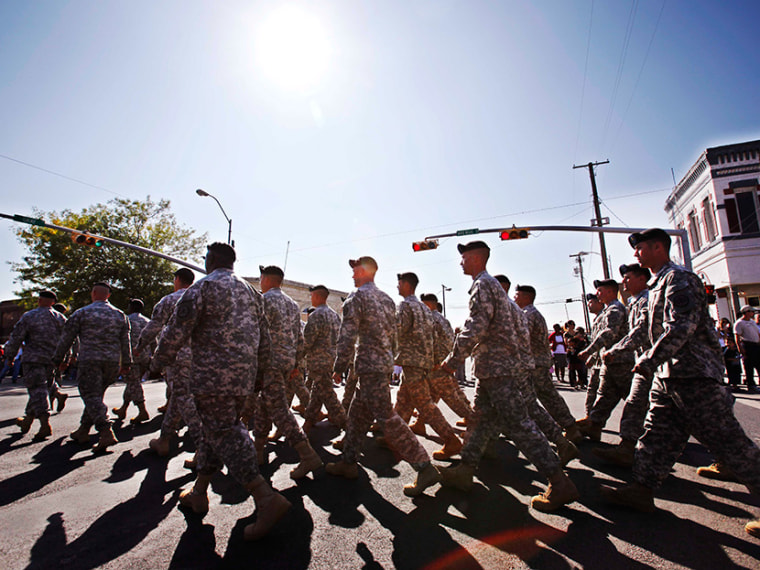Convicted Ft. Hood shooter Nidal Malik Hasan and the military prosecutors who tried him likely agree: Hasan should be executed.
"He does seem to be doing whatever he can to get the death penalty," said Eugene Fidell, a military law expert who teaches at Yale Law school. "If it's ever appropriate, this is a good case for it because of the number and gravity of the homicides he's committed."
The reason Hasan appears to be seeking the death penalty for himself is likely the same as the one that compelled the 42-year-old Army psychologist to take up arms against his colleagues in the first place. Hasan was convicted last week by a military panel of 13 counts of murder and 32 counts of premeditated murder for his 2009 rampage in which he opened fire on a crowd of servicemembers and civilians at Ft. Hood, Texas.
"As a supporter of al-Qaeda's agenda, Nidal doubtless views his crime as a military act to protect the broader Muslim community from American aggression," said Will McCants, a former State Department counterterrorism expert. Hasan wanted to argue as part of his defense that he acted to protect Taliban leaders, but the judge barred him from doing so. "A punishment of life imprisonment or death at the hands of the Muslim community's alleged aggressor is but one more act of heroism meriting a reward from God in the afterlife. Of the two punishments, death is more likely to ensure his otherworldly rewards a martyr according to the jihadist understanding of Islamic scripture."
Hasan has seemingly sought the death penalty since his trial began. His initial plea of guilty was altered by the judge because under military law prosecutors could not seek the death penalty against a defendant who pleaded guilty in a capital case. Hasan represented himself at trial, but the lawyers assigned to defend him sought to withdraw, saying it would be "morally repugnant" to assist Hasan in seeking the death penalty. In his opening statement at trial, Hasan said that "the evidence will clearly show that I am the shooter," and that "I was on the wrong side of America’s war and I later switched sides."
In courts-martial, the same panel that determined Hasan's guilt will determine his punishment. In a capital case, the panel has to be unanimous in sentencing Hasan to death. There are several servicemembers on death row, but the last execution of a servicemember occurred in 1961 during the Kennedy administration.
"Eventually the 52-year streak is going to break," said Fidell. "This might be the case that does that." Fidell says that appeals and other legal issues might delay Hasan's execution for a few years should he get the death penalty, but that he sees no major defects in the trial that could lead to the verdict being overturned.
That Hasan would see himself not as a murderer being punished, but as a martyr to his cause, is one reason he shouldn't be put to death, said Col. Morris Davis, a former chief prosecutor for the Guantanamo Bay military commissions. Being executed by the United States would complete the mission he began when he opened fire on his colleagues at Ft. Hood four years ago.
"What Major Hasan is trying to do at his court-martial is the same thing Khalid Sheikh Mohammed is doing at Guantanamo in his military commission and what [convicted 9/11 co-conspirator] Zacarias Moussaoui tried to do at his trial in federal court: become a martyr," said Davis. "In my opinion, rather than give any of them what they want—the supposed glory of dying for the cause and becoming a hero in the eyes of many—I would prefer to see them enjoy very long lives being totally irrelevant and over time largely forgotten."
Judge Leonie Brinkema, who presided over the trial of Moussaoui, famously told him at the conclusion of his trial that "The rest of your life you will spend in prison. You will never again get a chance to speak, and that is an appropriate and fair ending." Hasan, Davis says, should share the same fate. "That, to me, is a punishment worse than death for men who consider being executed by America as the ultimate badge of honor," he said.
McCants, who favors the death penalty option, adds that no matter the outcome, Hasan's actions have already made him a hero to terrorist groups. Executing Hasan "may be a boon for jihadist propaganda but so would his continued existence as an imprisoned celebrity," said McCants. "We have to seek justice for the families of the servicemen and women he killed."
